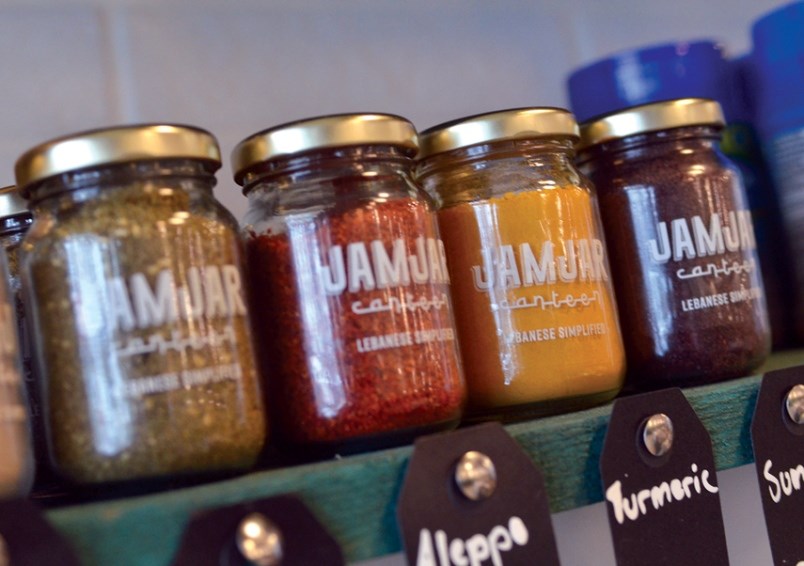Jamjar, which began in Vancouver on Commercial Drive, recently opened another outlet called Jamjar Canteen in the bustling Shipyards district at the bottom of Lonsdale.
An emphasis on hospitality, particularly the sense that guests should not leave hungry, informs everything about the Jamjar experience, including its name.
In a previous meet-up, Jamjar co-founder Fadi Eid explained a long-standing Lebanese cultural phenomenon, called mouneh. Hailing from the Arabic term mana, which connotes storage or preservation, mouneh is the practice of canning seasonal goods for consumption later. This exists in almost every culture in which there are defined growing seasons, to be sure, but where the Lebanese practice takes on a life of its own is at the intersection of the practical and the communal. You see, once goods are preserved, in traditional “jam jars,” for instance, they are not guarded for the exclusive use of the producer. Rather, they become catalysts for community building as they are shared with neighbours, friends, family members, visitors, and hosts alike. The guiding idea of mouneh is to ensure that the bounty with which one is privileged is made available to others.
A jam jar of seasonal goods would be brought to your host if you were visiting somewhere, for instance, or sent along with a guest who dropped in to say hello. In this way, not only is no one left wanting, but the fruits of one community can be enjoyed by another, contributing to a cohesive shared experience of the country’s goods.

At Jamjar Canteen Shipyards, patrons will find examples of mouneh packaged in the eponymous jars, available for catered events. Many of these take the form of actual meals, like Mujadara, a cinnamon scented lentil stew with caramelized onions, or Falafel with onions, garlic, and spices. All jars are prepared with layers of Jamjar’s celebrated hummus, brown rice, cabbage salad, and spinach dip.
The main menu at Jamjar, however, is comprised of mezze, a variety of smaller plates, both hot and cold, designed to share, a style of eating known by this name through much of the Mediterranean. Beyond mezze, Jamjar serves hearty bowls with a starring protein surrounded by various vegetables, each lovingly seasoned and prepared to be tasty in its own right.
In their new Shipyards loction, the kitchen dominates the space, running almost the entire length of one side of the room, with a smattering of tables and stools along the other. Guests are greeted at the till near the entrance of the room, where they place their meal orders. The space is brightly lit, efficiently designed with a designated order pickup counter, and clearly emphasizes takeout as a preferred mode of service.
Jamjar fare generally travels well; if you intend to eat as soon as you get your items home, you can likely do so without reheating. Having said that, I would offer that Jamjar’s best dish, one that regular patrons will know intimately and one that also appears on the menu of Lebanese multi-outlet restaurant predecessor Nuba, of which Eid is an alumnus, Makali ($8.50), is best eaten on-premise fresh off the kitchen line.
Makali is the stuff of lore, a deep fried cauliflower dish with a pomegranate molasses coating that is so much greater than the sum of its parts as to be unfathomably, unreasonably delicious. The chestnut brown morsels of cauliflower, a vegetable that ascended to deity status within the ranks of hipster cuisine through the second decade of this century but that too often is lazily prepared and under-seasoned, delivers a rich, deeply toasted and tangy flavour profile here with a rewarding texture that is at once soft in the flower portion and al dente throughout the stems.

I am also a big fan of Jamjar’s take on Hushwie ($9.50), a dish of complexly seasoned ground beef prepared with onions and toasted pine nuts. The beef reveals warm brown spice notes and works well with a dollop of hummus on a wedge of pita. I placed an order for a separate side of Jamjar hummus ($5) not realizing that nearly all the hot mezze dishes come served atop a generous dollop of hummus with sliced vegetables and a side of pita. Of course, arguably it is not possible to have too much of the hummus here, its silken, creamy texture proving exceptionally rich and rewarding.
Makanik ($11.99), a dish of short, densely packed, housemade lamb sausages with Lebanese seven-spice seasoning, followed. While the sausages showcased the expected flavors of the spice mix, including, if my palate is correct, earthy nutmeg, cinnamon, aromatic clove, citrusy coriander, and toasty cumin, I found them to be on the dry side, the lean meat drained of its succulence perhaps through overcooking. I have had this dish before and did not find the meat dry, so I will chalk this up to a one-off miscalculation.
In addition to the hummus, from the cold mezze menu I ordered Spinach Dip ($5), which I found extraordinary in its robust spinach quotient and aromatic greens, yielding an incredibly thick, herbaceous, and rich dip that I spread across more or less everything else on my plate. A final dip of Muhammara ($5), a somewhat spicy red pepper-based puree with garlic, lemon juice, and a host of herbs and spices, was a bright and fresh counterpart to the bold flavours of the hot mezze.
The fare here at Jam Jar Canteen is, I feel, a nod to its progenitor, a taste of the broader Lebanese experience available on The Drive. For me it is most definitely a complement to a familiar experience, but not a rival to it.
Jamjar Canteen is located at 122-125 Victory Ship Way in North Vancouver
Read more from the North Shore News



